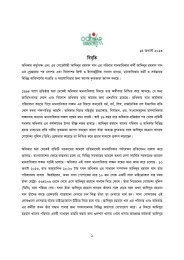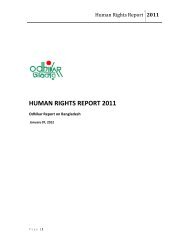Please - Odhikar
Please - Odhikar
Please - Odhikar
Create successful ePaper yourself
Turn your PDF publications into a flip-book with our unique Google optimized e-Paper software.
the application of other statutes as the essence of rule of law itself in a real sense remain<br />
incomplete.<br />
Victims experience physical, financial and psychological/emotional impacts of victimization. At<br />
the time of the crime, or upon discovering that a crime has occurred, victims are likely to<br />
experience a number of physical reactions to the event. These may include increased heartbeat,<br />
hyperventilation, shaking, numbness, dryness of the mouth, etc. Some of these reactions may not<br />
take place immediately, they may reoccur at a later stage when the memory of the crime flashes<br />
back. Victims may suffer a range of physical effects including insomnia, loss of appetite,<br />
lethargy, headaches, muscle tension, nausea etc.<br />
As for the financial impact of crime, the victim may incur costs such as: repairing property or<br />
replacing possessions, installing security measures, accessing health services, participating in the<br />
criminal justice system for instance attending the trial, obtaining professional counseling to<br />
come to terms with the emotional impact, etc. In terms of psychological injuries, some victims<br />
suffer acute stress disorder, or develop PTSD (post traumatic stress disorder) or other adjustment<br />
disorders from victimization.<br />
The victims are negatively affected persons or groups who have suffered physically and/or<br />
financially and even emotionally and psychologically, directly or indirectly from the criminal<br />
activities. In fact, the principles of the criminal justice system should consider their welfare,<br />
remedy and security. They are simply regarded and considered as informers, approvers or<br />
witnesses. Their virtual role as a victim, deserving justice, is not primarily accepted and<br />
considered.<br />
Female victims of crime are more vulnerable to sexual and other abuses and to abuses at the<br />
hands of government penal agencies. Most of Nepal's police are not trained to deal with crime<br />
against women and often do not take women's reports seriously. Rape victims and victims of<br />
domestic abuse are often not dealt with sympathetically. Women complainants are intimidated<br />
by the bureaucratic procedures and few cases end in convictions. In many ways prostitutes are<br />
victims of society and also deserve sympathetic treatment. Training on how to deal with these<br />
sort of cases is just beginning for Nepal's police. There are no government shelters for victims of<br />
domestic abuse either.<br />
Status of Victim's Rights in Nepal<br />
Victims have the right to be treated with dignity and respect. In Nepal victims only enjoy a<br />
limited right of representation in trials and do not enjoy the right to appeal against acquittals or<br />
the withdrawal of cases. There is no law to respect the right of victims to information about the<br />
status of their case during prosecution or trial.<br />
Victims have the right to be protected from intimidation and harm. In Nepal victims are often<br />
not protected from further victimization even where cases have involved personal violence; no<br />
law compels the prosecution to inform victims if accused persons are released on bail; victims'<br />
fear of retaliation are not considered while conducting bail hearings; no efforts are made to<br />
protect victim's interests during trials; during trails victims are required to come out into the<br />
public glare and have often to face inconvenient and irritating questioning by defense lawyer;<br />
and courts often fail to exercise their powers to protect victims from unnecessary media<br />
198<br />
Report 2005











